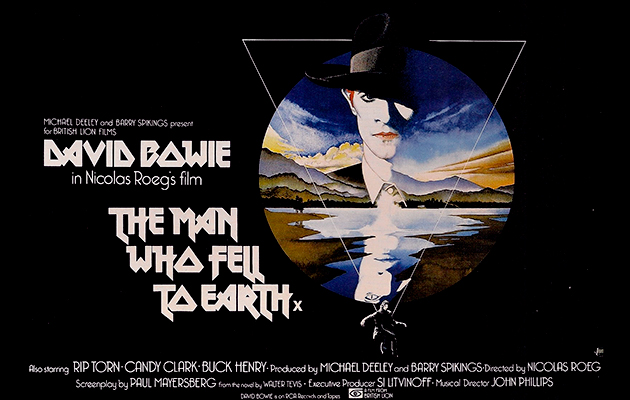Back to the plot: randy chemistry professor Nathan Bryce (Rip Torn) has become obsessed with Newton’s corporation. Offered a vital, but unspecified, job by Farnsworth, his mind develops its own libido and he quits fucking his girl students to concentrate on World Enterprises. Oblique and illusory so far, the film threatens to reveal all in a memorable scene inside the newly built spacecraft. Newton, sensing Bryce’s confusion, prompts him to pose the question he’s been meaning to ask since day one. Torn narrows his eyes, leans forward and dumbly asks: “Are you a Lithuanian?”
Litvinoff recalls the day of the shoot. “I knew Rip well and assumed that, when he arrived, he would be wound up tight and be defensive and very edgy.
I knew David pretty well, too, by this point, and knew he was staying up late learning his lines and composing the music that could and should have been the score. Since most rock stars in the ’70s had those reputations, he had promised me not to do any cocaine during the shoot. I also knew he had an aversion to pills. When Rip arrived very edgy, the two of them walked round and round each other like caged animals sizing each other up, and I sensed that help was needed. So I got some tequila in a paper cup for Rip and I ground up NoDoze [caffeine-rich tablets] for David to snort. It ultimately calmed them down. And this only after having to deal with the aforementioned British Lion person [producer Deeley], who came into the spaceship outraged at what he thought was David snorting cocaine.”
Bowie stayed coke-free during the three-month shoot. Instead of his $200-a-day habit, he had his suitcase full of books, painting, UFO-spotting and work on a partly autobiographical volume of stories called The Return Of The Thin White Duke. He was also beginning to dabble in the occult, an obsession that would have terrifying consequences. It was his flirtation with the Kabbalah, diabolist Aleister Crowley, the Hermetic Order of the Golden Dawn, its connections to Nazi iconography and Egyptian mysticism that would bring him close to a breakdown within a year. For now, he was praising Roeg’s magical touch as “like that of an old warlock”. Still hyper-thin (not far off the 90lb that Newton weighed in Tevis’ novel), Bowie’s diet largely consisted of ice-cream.
As for laying off the other white stuff, was it something that Roeg had discussed with Bowie? “I decided to not do anything or say anything,” he insists. “You can’t reason someone out of anything. I’m not into the guilt thing or trying to cure anybody of their humanity. There are certain things I wouldn’t want to know about someone anyway, even those nearest and dearest. And I wouldn’t want them to know certain things about me.”
By the end of the film, World Enterprises has become too great a threat to American big business. The sinister government agency that has been tracking Newton since he first landed decides to take action. Betrayed by Bryce, Newton is kidnapped as he prepares to leave for home in his spacecraft. Mary-Lou is bought off. Farnsworth – in an odd moment of slapstick and horror – is attacked in his home by two heavies in football helmets. Attempting to throw Farnsworth from his apartment window, the glass fails to break. “I’m sorry,” whimpers the lawyer. Next time they succeed, and he hurtles to his death. Examined by a medical team and detained for what may be years, Newton is finally released a broken man. By now alcoholic, his final act of desperate defiance is to cut a record for his wife – The Visitor – and hope radio play will send its airwaves out into space towards her.
Notwithstanding its atmosphere of philosophical solemnity, The Man Who Fell To Earth is quite mischievous. When Bryce finds The Visitor in a record shop, he passes a display stand of Young Americans sleeves. In the final scene, during which Bryce tracks down Newton to his favourite bar, the alien asks if he enjoyed the record. Bryce flatly replies, “Not really.” It’s there in odd echoes of Roeg’s previous work, too. When a hooded Newton appears to Bryce in hallucinatory form while lake-fishing, it’s akin to the Venetian nightmare of Don’t Look Now. There’s even a veiled kiss-off to Bowie’s recent past as the credits roll – a drunken Newton slumped in his chair to the refrain of Artie Shaw’s “Stardust”.



